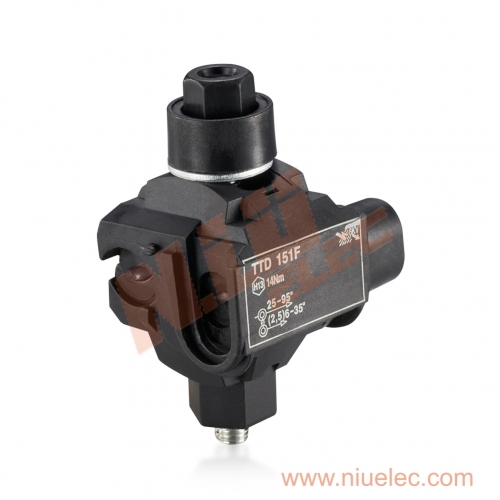By niuelec | 02 April 2024 | 0 Comments
Insulation Piercing Connector Applications Across Industries
In the intricate web of industries that underscore modern life, one unassuming hero stands out - the insulation piercing connector (IPC). This often-overlooked electrical tool has revolutionized the way we connect wires in a range of applications, from power grids to home electronics. The IPC is not just about convenience; it's a vital innovation, fostering safety, efficiency, and unprecedented connectivity across sectors.
Utility Sector Utilization of Insulation Piercing Connectors for Electrical Grids
In the vast expanse of the utility sector, where power distribution is paramount, IPCs play a crucial role in streamlining the infrastructure. These connectors facilitate quicker and more secure connections of overhead lines and underground cables, which are the arteries of the electrical grid.Traditionally, utility workers would spend hours meticulously stripping insulation from wires before making connections. Now, with the advent of IPCs, a simple twist and lock motion can pierce the insulation, providing a contact surface that ensures a reliable electrical connection. This not only saves time but enhances safety, as it reduces the risk of electrical accidents.
Furthermore, IPCs are instrumental in various applications within the utility sector, ranging from smart meter installations to streetlight maintenance. This versatility, combined with their durability in harsh environmental conditions, makes them an indispensable asset for utility companies worldwide.
Telecommunications Industry Adoption of Insulation Piercing Technology
Communication is the lifeblood of modern society, and the telecommunications sector relies heavily on IPCs for the swift and stable connection of wires in telephony, data transmission, and broadcasting.Telecom engineers have found that IPCs offer a cost-effective and prompt solution for wiring tasks, thereby reducing labor time on site. High-frequency signals require impeccable connectivity, and IPCs provide just that, with minimal signal loss or interference.
From the installation of fiber optics to maintaining communication towers, IPCs have become an essential tool for telecommunication companies. Their capacity to pierce a wide variety of insulation types ensures compatibility with the diverse range of cables used in the industry, cementing their status as a go-to technology for secure and long-lasting connections.
Automotive Engineering: Insulation Piercing Connectors in Vehicle Wiring Systems
The automotive sector is one marked by constant innovation, and IPCs have found their place under the hood, contributing to the efficiency and reliability of vehicle wiring systems.In modern vehicles, the role of electronics is continually expanding, from fuel management systems to on-board diagnostics. IPC technology offers automotive engineers a way to connect these systems without compromising the integrity of the vehicle's wiring.
Their non-destructive piercing action allows for connections to be made without compromising the wire's insulation, thus maintaining the wire's original properties. Whether in mass production or aftermarket enhancements, IPCs have proven to be a valuable resource in the automotive industry for ensuring consistent performance and energy management.
Aerospace Applications: Ensuring Reliable Connections with Insulation Piercing Connectors
The aerospace industry has exacting standards, with no room for error when it comes to electrical connections. Insulation piercing connectors have become integral in this field, especially in the development of aircraft wiring and avionics systems.In an environment where weight and space are at a premium, IPCs offer a far less bulky and invasive alternative to traditional connectors. Their ability to provide a secure electrical joint without the additional bulk of connectors or coring tools is highly advantageous, particularly in tight spaces within aircraft structures.
Aerospace engineers value IPCs for their reliability and long-term stability in the harsh conditions of high-altitude flights, where temperature and vibration extremes can compromise electrical connections. By using IPCs, the aerospace industry maintains its commitment to safety and precision, ensuring that passengers and crew receive uninterrupted communication and functional avionics.
Renewable Energy Integration: Insulation Piercing Connectors in Solar and Wind Power Installations
The renewable energy sector is a beacon for technological progress, and IPCs contribute significantly to the installation and maintenance of solar and wind power systems.Solar panel arrays and wind turbines consist of numerous electrical connections that must be installed and maintained with the utmost care to ensure optimal energy production. IPCs provide a fast and secure method of connecting power cables while also preventing potential damage to the cable insulation.
In wind energy, IPCs are used for batwing connectors — complex electrical connections across the blades of wind turbines. IPC technology offers a non-invasive way to connect the electrical wiring for the lights that encircle the blades, crucial for safe night-time navigation, with minimal impact on the blade's surface.
For solar energy, where installations often cover vast areas, IPCs enable a swifter assembly process with minimal disruption to the solar panels' protective layer, enhancing the overall efficiency of the system.
IPCs are an unsung hero in the diverse landscapes of industry, providing solutions that are far-reaching and impactful. From the prodigy of power grids to the innovative wings of energy generation, their influence is felt and their worth, immeasurable.
Leave a Reply
Your email address will not be published.Required fields are marked. *
CATEGORIES
